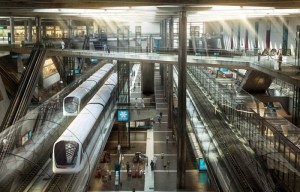Source: www.oxfordbusinessgroup.com
Vast stretches of desert once tracked by camel trains will soon be spanned by one of the world’s most modern and sophisticated transport systems, with Saudi Arabia now developing a countrywide rail network that underpins the government’s programme to diversify the economy.
 Data compiled by the Dubai-based news agency Zawya in late 2012 showed there were just under $150bn worth of rail projects in the Gulf region either already under construction or planned for completion by 2030. Of this, almost one-third of the confirmed work is to be carried out in Saudi Arabia, which has committed to rail developments worth $45bn.
Data compiled by the Dubai-based news agency Zawya in late 2012 showed there were just under $150bn worth of rail projects in the Gulf region either already under construction or planned for completion by 2030. Of this, almost one-third of the confirmed work is to be carried out in Saudi Arabia, which has committed to rail developments worth $45bn.
In total, the Kingdom is planning to lay some 7000 km of track, including light rail and metro schemes in Makkah and Riyadh; links to the planned GCC-wide network; an east-west rail corridor linking the Red Sea with the Gulf; and connections for most of the major ports and industrial centres.
It is perhaps not surprising that Saudi Arabia is leading the way on rail spending, given the size of the country and the difficulty of much of the terrain. While some of the other states in the Gulf have only to contend with relatively small areas, the Kingdom’s land mass is far larger than all of the other five GCC states combined. It also has a varied geography that includes desert and mountain ranges. While much of the capital to be invested in Saudi Arabia’s rail network will be directed to standard construction work, there will also be engineering challenges that will require costly solutions.
The expected surge in rail investments should be welcomed by the transport sector, which saw growth stagnate in 2012, despite the overall economy expanding by 7.5%. According to a report by the National Commercial Bank at the end of February, the sector declined by 1.3%. However, the report added that transport would rebound in 2013, as more railway projects were rolled out.
It has taken some time for Saudi Arabia to develop plans for its rail aspirations. Feasibility studies into some of the key components of Riyadh’s rail master plan, including the east-west corridor, were concluded in 2001, with studies coming down firmly in favour of the scheme, citing their strong potential to boost economic development.
Part of the reason for delays has been the conflicting calls on the nation’s infrastructure budget, with roads and ports long being given priority, while shifts in long-term economic planning have also impeded progress. However, now that the government has committed to spending more than $500bn on infrastructure, industrial and social welfare projects by 2020 in a bid to expand the economy’s base away from a dependence on oil, the transport sector is being brought to the fore, with a particular emphasis on rail.
One of the more recent proposals for rail development is a connection between Saudi Arabia and Bahrain. In late February 2013, Saudi and Bahraini officials met for another round of talks on the plan to build a rail link connecting the two countries. The line, which would run parallel to the existing King Fahd Causeway, has an estimated price tag of $4.2bn. A feasibility study for the project is due to be completed early in 2014. More info


















